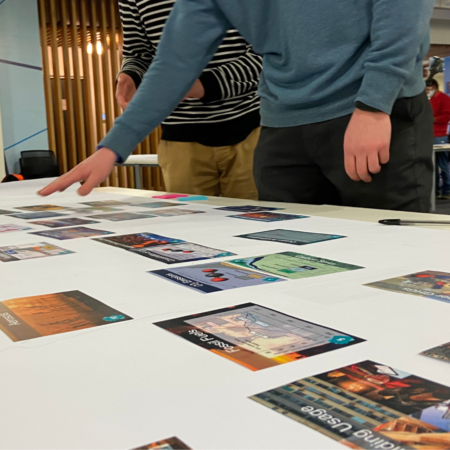Dr Scott Strachan, Senior Teaching Fellow at the University of Strathclyde, shares his perspective of Climate Fresk
Albert Einstein said that “without changing our pattern of thought, we will not be able to solve the problems we created with our current patterns of thought.” Put more plainly this tells us that we cannot rely on the same thinking that caused our problems to fix them.
In the context of climate change and sustainability, these words emphasise the role of education and educators in changing the ‘way we think’ about the world around us and “equipping learners with the skills, attributes and competencies required to safeguard our [highly interconnected] social, environmental and economic wellbeing”, as set out in UNESCO’s definition of Education for Sustainable Development.
Fundamentally, understanding such complex global problems and systems, with all of their interconnectness, requires a new ‘way of thinking’.
Research has shown that people who score higher on ‘systems thinking’ – so-called ‘systems thinkers’ – are consistently more likely to be better informed, and subsequently more likely to take effective action on climate change [Yale Ref]. Systems thinking not only has the capacity to help us better understand such complex systems and problems, but has the potential to better equip us to tackle them by enabling us to identify the key leverage points that might lead to the kind of systems change required.

At the University of Strathclyde we’re making the connection between systems thinking and climate education, and we’re using Climate Fresk, among other tools, to help us make this connection. We’re using it to not only highlight the uncomfortable truths that lie amongst the cause and effects, the feedback loops and tipping points embedded in our climate system (and in our Fresk), but to also emphasise in the power of systems thinking in helping us better understand these and address them. The Climate Fresk activity encourages participants to exercise systems thinking to better understand the problem (i.e. the cause, effects, impacts and interdependencies associated with climate change) and consider the range of solutions (i.e. the mitigation, adaptation and implementation challenges) required to “keep 1.5 alive” and secure a sustainable future for all.
If you haven’t already done so, next time you participate in, or run a Climate Fresk workshop, you might take a moment or two to reflect on the systems thinking approach the workshop encourages and supports, and how the power of systems thinking might be extended further to explore the type of systems change we’ll need to avert the climate crisis in a way that is just and equitable.
Dr Scott Strachan, Senior Teaching Fellow at the University of Strathclyde
Recommended reading – Meadows, Donella H. 2015. Thinking in Systems, Chelsea Green Publishing.
